Inaugural ISGS Go Promotion Awards Celebrate Innovation and Excellence
Daniela Trinks & Kim Chaelim / September 11, 2023
On a momentous occasion, the international Go community came together after a conference to celebrate the inaugural ISGS Go Promotion Awards, recognizing outstanding contributions in the realms of Go education and promotion. This awards ceremony, held for the first time, showcased innovative ideas and initiatives.
The ISGS Go Promotion Awards took the form of a poster contest, inviting Go educators, researchers, and promoters to share their wealth of knowledge, strategies, and projects aimed at advancing Go development. From North America to Europe and Asia, the response was overwhelming, with a total of 11 submissions pouring in from across the globe. This international participation underscores the universal enthusiasm and interest surrounding the game of Go.
The submissions covered a broad spectrum of topics, all with one common objective: to elevate Go education and promotion. These initiatives ranged from novel teaching methodologies to creative ways of disseminating Go knowledge.
The heart of this event lay in the meticulous evaluation carried out by our esteemed jury of 9 members from North America, Europe, Asia, and Oceania. Their task was to select the winners across three distinct categories. What made this process even more remarkable was that it was a blind review, ensuring that each submission was judged purely on its merit without any bias.
I would like to take this opportunity to express my sincere gratitude to our esteemed jury, all of them being renowned Go educators and organizers with many years of experience: Prof. Thomas Hsiang (USA), Siddhartha Avila (Mexico), Yuki Shigeno 2p (Japan), Prof. Sun Dechang (China), An Younggil 8p (Korea/Australia), Prof. Damir Medak (Croatia), Dr. Ahmet Eren Kurter (Turkey), Kalli Balduin (Germany) and Dr. Silvia Lozeva (Australia).
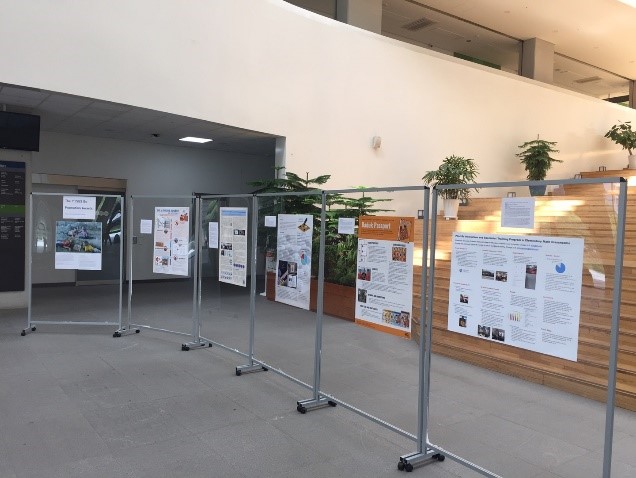
All posters were exhibited during the one-day 1st ISGS International Conference on Go Studies at Myongji University, as shown in the picture above.
Next, I’d like to introduce the winners in each category.
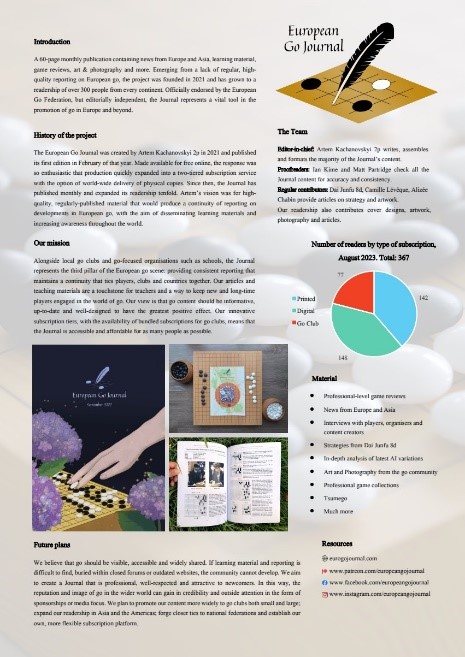
In the Excellence in Go Promotion Award category, we honor Artem Kachanovskyi for his outstanding Go project that has captivated many Go fans. Kachanovskyi introduced the European Go Journal, a monthly publication, in 2021. Serving as both chief editor and writer, he created a platform that addressed the need for consistent European Go reporting. With its innovative content featuring game reviews, Go news, interviews, Go techniques and strategies, as well as Go artwork, the European Go Journal has steadily increased its readership to over 360 subscriptions worldwide, establishing itself as an essential tool for promoting Go in Europe and beyond. We pay tribute to his unwavering dedication, especially in the face of the challenging circumstances of the Ukraine conflict.
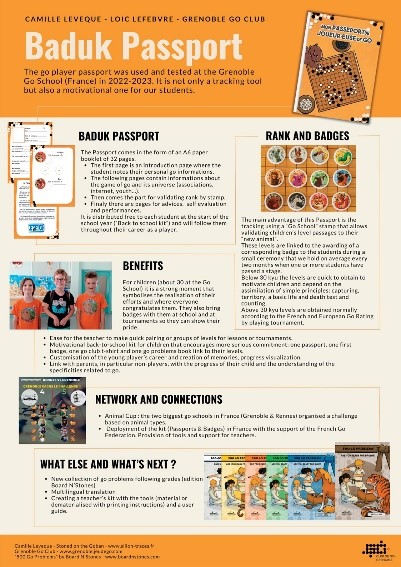
The Outstanding Go Education Award was given to Camille Levêque and Loïc Lefebvre from France in recognition of their substantial contributions to Go education and innovative learning methods. They presented the ingenious "Baduk Passport," a 32-page A6 booklet that not only tracks students' progress but also serves as a source of motivation and engagement on their Go journey. Implemented and tested at the Grenoble Go School, this creative tool includes personalized information, game insights, and validation of ranks through stamps, advice, self-evaluation, and performance sections. The "Baduk Passport" has elevated the learning experience, boosting motivation while reinforcing the bonds between students, teachers, and parents.
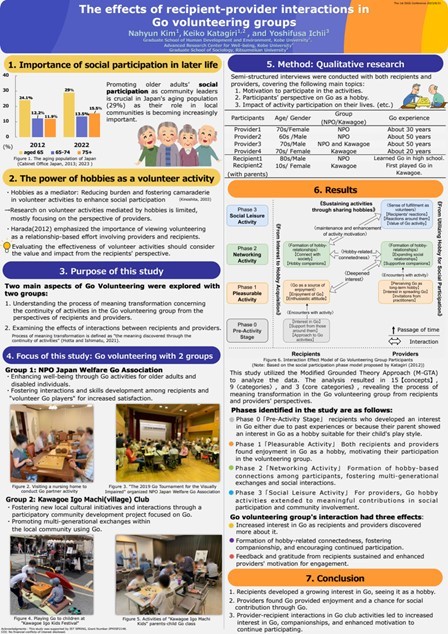
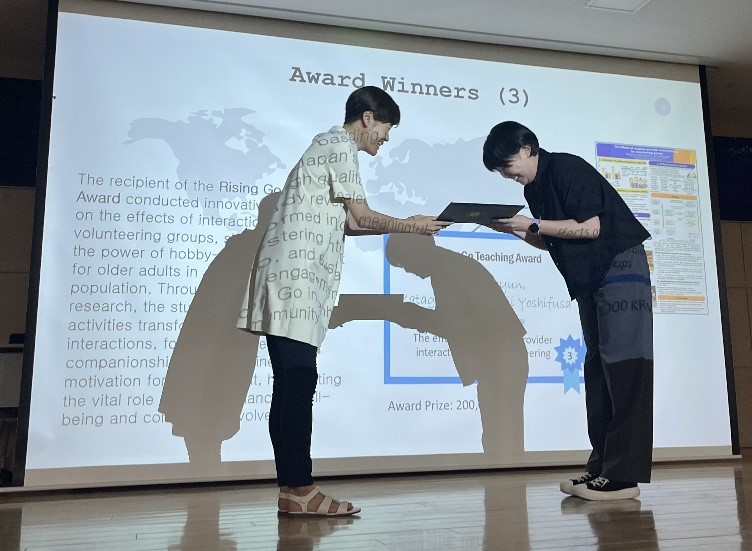
Finally, the Rising Go Teaching Award goes to Ph.D. student Kim Nahyun from Korea and her research partners Katagiri Keiko and Ichii Yoshifusa from Japan. They have showcased their potential to make a significant impact on Go education and promotion through their insightful research. Their poster entitled “Study on the effects of interactions within Go volunteering groups” has shed light on the power of hobby-based engagement for older adults in Japan's aging population. Through qualitative research, Kim et al.’s work has highlighted how Go activities can transform into meaningful interactions, fostering interest, companionship, and sustained motivation for engagement. The study’s results demonstrated the vital role of Go in enhancing well-being and community involvement.
Last but not least, on behalf of the ISGS, I’d like to extend my gratitude to all participants for their invaluable contributions. Your tireless efforts to advance Go are praiseworthy and promise to leave a lasting imprint on the Go community. I’m looking forward to future editions of these Awards and the positive transformations they will bring.
Thank you all for being part of this remarkable journey. Together, let's continue supporting Go education and promotion. Stay tuned for updates on the next ISGS Go Promotion Awards!
Introducing the Poster Authors of the 2023 Go Promotion Awards
Title: Dialogue with Stones
Author: Joan Lluís i Rabassó
Country: Spain
Affiliation: Spain Go Association (Asociación Española de Go)
Author’s profile: My name is Joan Lluis i Rabassó. I am a telecommunications
engineer, but I also like philosophy. I got to know the game of go in 1997, but I barely got to play a few games. However, I have always felt fascinated by its beauty and by everything that is learned thanks to it in all contexts of life, especially in achieving personal balance and the possibility of resolving conflicts. I used to collaborate on writing articles for the European Go Journal. I have recently founded a go club in my town and have translated the first go book into Catalan.
Title: Multilingual Go Book Project - A Go book for everyone
Author: Haris Kapolos (Greece)
Affiliation: EGF
Names of the translators: Lucas Félix de Oliveira Santana (Brazillian-Portuguese),
Jean-Louis Tu (French), Thanasis-Ricardo Arvanitis (Spanish), Joan Lluís i Rabassó (Catalan), George Stihi (Romanian), Dmitry Bovichev (Russian),
Author’s profile: Haris Kapolos was born and is still living in the Greek countryside
after completing his university studies. He has extensive experience working as a private tutor and as a typesetter for the local newspaper and he is a massive English fantasy and sci-fi fan. Those fields of work along with his love for books and his habit of writing walls of text in various internet fora provided him the knowledge and the idea of trying to write a guidebook for Go. He learned about Go around 2005, but his obligations didn’t allow him to seriously act upon his passion for the game until August 2016.
Title: Peace
Author: BAE Sangpil
Country: Republic of Korea
Affiliation: Future Trade Institute
Author’s profile: The author heads the Future Trade Institute and has been an emeritus professor at the College of Business, Kwangwoon University in Seoul, lecturing on entrepreneurship, startup, and overseas market research, etc. One of his hobbies is Baduk which he has enjoyed for over half a century primarily by reading the game records of famous professional Go players of Korea, Japan, and China. He likes to paint. His idea that learning and playing the game of Go could help not only reduce human violence instinct to some extent but also increase amicability among players thus eventually contributing to peace is expressed in watercolor painting.
Title: European Go Journal
Author: Artem Kachanovskyi
Country: Ukraine
Affiliation: European Go Federation
Author’s profile: Artem Kachanovskyi is a highly accomplished 2 dan pro Go player with a great passion for the game, and an impressive list of achievements throughout his career. Starting at the age of 7, he learned the game from his father and quickly developed his skills, becoming the fifth EGF pro in 2016. With a background in computer science and a successful 5-year career as a programmer, he eventually decided to fully dedicate himself to Go. Among his numerous achievements are several top placements in prestigious tournaments, including Grand Slam victories and European Go Championship successes. In addition to his Go endeavors, he also founded the European Go Journal.
Title: Exploration of the Undergraduate Course Teaching Model of Go Communication Based on Student-centered and Ability
Authors: [1] CHEN Jinduo & [2] WU Yi
Country: China
Affiliations: [1][2]Go Department, School of Journalism and Communication, Shanghai Jian Qiao University.[1]School of Journalism and Communication, Shanghai University.
Authors’profiles
Chen Jinduo is currently serving as a teacher in the Weiqi Department at Shanghai Jianqiao University's School of Journalism and Communication. Alongside his teaching responsibilities, Chen Jinduo is pursuing a PhD in the same field at Shanghai University.
Wu Yi is an undergraduate student with a passion for Weiqi (Go). Currently enrolled in the Weiqi Department at Shanghai Jianqiao University's School of Journalism and Communication.
Title: 101 Dorgonians
Authors: Cătălin Țăranu & Mihaela Țăranu
Country: Romania
Authors’profiles:
Mihaela Taranu learned Go at the Saijo club in Bucharest, where she met Catalin Taranu. Few years later they moved to Vatra Dornei, a small town in northern Romania where the family of Catalin still lives.
About 8 years ago she started teaching in schools, then at the Go club. She is very successful with young kids because she manages to make the lessons fun for them. Currently over 30 youth attend the Go club actively and Go has become a popular activity in town. Each year new parents send their kids to the Go club.
Catalin Taranu became a 5 dan pro at Nihon Kiin, Japan. He decided to return to Europe to promote Go at the age of 30, in 2004. He opened the Saijo Go club in Bucharest and attracted a lot of new players there. This lasted for 9 years, during this time a lot of events and tournaments were organized. After meeting Mihaela and having two children together they decided to move to Vatra Dornei, the hometown of Catalin. There Mihaela started teaching in schools and soon they started to organize Go events. This was noticed by the town hall and a new Go club was founded. Thus teaching activities moved to the new room that was provided by the town hall. In time activity has increased and so has the financing received. The activity at the local level became so successful that in 2023 a new project was launched and events are being organized every two months, also cooperation at the regional level has increased a lot.
Catalin is currently the EGF youth manager and came up with reforms meant to change
the way youth activities are handled in Europe.
The Sajo European Youth Go (SEYGO) tour is a Grand Prix-style tournament that was launched five years ago. In the past, youth events at the European level were sorely lacking, SEYGO tour filled an important gap by providing events designed for youth and a voucher system quite appreciated by youth and parents alike. From next year there are plans to expand the scope of activities with a Grand Final at the London Go Center. Also, Catalin came up with new ideas like the EYE team (European Youth Elite) which should be a new motivational factor for top youth as well as a form of training and selection for participation of top European youth in international tournaments like WYGC or Globis Cup.
A youth managers group was formed 1 year and a half ago, with the intention of improving the communication network in Europe.
Among the new reforms planned for the near future is the launch of a European teacher's network, aiming at providing valuable tools for teachers and organizing an annual event 'The European Go Teacher's Congress'.
Currently, Catalin's biggest focus is to document the successful local activity in Vatra Dornei and other similar undertakings and provide examples of good practice and working models in order to expand this type of activity in other places in Europe.
Since all those activities are costly in terms of time and energy but are not producing
income, financing from stronger Go countries is sorely needed.
Title: Pilot Go Instruction and Specialist Training Program in Elementary Math Classrooms
Authors: [1] Xiuwen Wu & [2] Xinming Guo
Country: USA
Affiliations: [1] National Louis University, [2] Go and Math Academy
Authors’ profiles
Xiuwen Wu is an associate professor of special education at National Louis University (NLU). Dr. Wu teaches the graduate math content and methods course in the program. Her research interests include: 1) use of Go game-based learning to enhance mathematics education for elementary-grade students, and 2) development of effective curriculum and instructional activities to improve mathematics instruction for diverse learners, particularly those diagnosed with dyscalculia. Dr. Wu has given workshops and made presentations on her research in conferences such as National Councils for Teachers of Mathematics (NCTM), American Education Research Association (AERA), and Council for Exceptional Children (CEC).
Xinming Guo is an Illinois licensed math teacher and founder of Go and Math Academy.
Mr. Guo teaches Go to thousands of students in the U.S. each year. He is the recipient of the national “Teacher of the Year” by the American Go Foundation in 2015 and Worldwide Iwamoto Awards winner in 2018. Mr. Guo’s innovative research on Go and math shows this game can help young students develop number sense, understand math concepts, and practice mathematical thinking. This is the key to spreading Go into elementary classrooms. Mr. Guo is also the education coordinator of American Go Association.
Title: Baduk Passport
Authors: Camille Levêque, Loïc Lefebvre
Country: France
Authors’profiles
Camille Levêque has been a French 2D player since 2018. She studied law and agricultural strategy. She teaches go, runs the Grenoble go school (the largest go school in France), and illustrates about go (Stoned on the Goban). She produces tools and art to promote Go in Europe, America, and Asia. She is the head of Communication for the 2024 European Go Congress in Toulouse (France).
Loïc Lefebvre is a French 3D player. He studied nuclear physics. He teaches go at the Grenoble go school too and creates animations for kids and adults to add more fun to the Go game. He works for the Grenoble Go Club (the largest go club in France) to introduce go in schools and organize many go events for all players. He is the head of Volontiers for the 2024 European Go Congress in Toulouse (France).
Title: Go, Let’s play!
Authors: Camille Levêque, Lucas Neirynck, Benoit Labayle
Country: France, Belgium
Authors’Profiles
Camille Levêque has been a French 2D player since 2018. She studied law and agricultural strategy. She teaches go, runs the Grenoble go school (the largest go school in France), and illustrates about go (Stoned on the Goban). She produces tools and art to promote Go in Europe, America, and Asia. She is the head of Communication for the 2024 European Go Congress in Toulouse (France).
Lucas Neirynck is 6 dan, Belgian go champion, and French Open champion. He teaches go in Paris in many schools and supervises the French youth go team for the French go Federation.
Benoit Labayle is Managing Director of Synchronique Editions. He founded Synchronique Edition in 2008 in Paris, as an independent publishing house dedicated to producing high-quality works on Asian cultures and Japan in particular. “Go À toi de jouer ! is one of my most exciting and challenging projects: how to introduce this wonderful strategy game to the general public, introduce children to it, convince parents to play and have fun with them, and gain the support of the educational community all at the same time with a project designed from the outset to be easily translated and widely sold around the world. I'd like to add that working with Lucas, the French Go champion, and Camille, also a successful player and talented illustrator, has been an immense pleasure on this project and they make the best team of Ambassadors to promote Go in Europe and the Western world.”
Title: The effects of recipient-provider interactions in Go volunteering groups
Authors: Nahyun Kim[1], Keiko Katagiri [1, 2], Yoshifusa Ichii[3]
Country: Japan
Affiliations:
[1] Graduate School of Human Development and Environment, Kobe University
[2] Advanced Research Center for Well-being, Kobe University
[3] Graduate School of Sociology, Ritsumeikan University
Authors’Profiles
Nahyun Kim is a doctoral student at Kobe University, Japan, with a master's degree in Sociology from Ritsumeikan University. Previously a professional Go player in Korea, her master's thesis explored social participation possibilities through Go clubs in Japan.
She was selected by the Japan Science and Technology Agency (JST) for the prestigious Support for Pioneering Research Initiated by the Next Generation (SPRING) Program. Her research focuses on understanding the dynamics of weak ties in both offline and online social participation and their effects on the psychological well-being of older adults. For more information about her research, visit: https://researchmap.jp/nahyun_kim.
Dr. Keiko Katagiri has been the Director of the Advanced Research Center for Well- being of Kobe University since November 2022, and Professor at the Graduate School of Human Development and Environment of Kobe University. Her research theme covers broad topics: social participation, civic engagement, social isolation, social capital, older workers, urbanization, and old family studies. Recently, she has conducted three research projects on Japanese third agers focusing on the effects of work and social participation, primary prevention of social isolation among older adults in urban housing complexes, and international comparative research on social support and ICT in three Asian countries.
Yoshifusa Ichii has a PhD in sociology from Ritsumeikan University. His research focuses on lifestyle sports, specifically parkour and skateboarding. As part of his research on lifestyle sports, he analyzes the cultural politics of making lifestyle sports official competitions in the Olympic Games. He has published several Japanese articles on the Olympics and an English paper ‘The capitalist realism of the 2020 Tokyo Olympic games’ in Contemporary Japan (2023). His research website is https://researchmap.jp/read0156159.
Title: Go Education Communication Platform and Go Teacher Professional Enhancement
Authors: CHANG Hsiao-Yin, LIN Hui-Ting, WU Chien-Lin, HUNG Yung-Hao
Country: Taiwan
Affiliation: Taiwan Weiqi Education & Development Association
Authors’profiles:
1. CHANG Hsiao-Yin:
◎Secretary-general of Taiwan Weiqi Education and Development Association
◎Doctoral candidate & Lecturer of Go Department of Korea Myongji University
◎Member of the Education Committee of the International Society of Go Studies
◎Principal investigator of the Taiwan Go Teacher Seminar
She used to be the Go promotion ambassador of the World Chinese Go Federation, and a lecturer at Fo Guang University. In 2015, she hosted the first Taiwan Go International Symposium. She has planned more than 30 large-scale Go events, served as the leader of Taiwan, more than 20 international exchange events, and written more than 80 Go reports.
2. LIN Hui-Ting:
◎Deputy secretary-general of Taiwan Weiqi Education & Development Association
◎Co-principal investigator of Taiwan Go Teacher Seminar
As a contributor to the promotion of Go, she began to promote Go education in elementary schools in central Taiwan in 2004 and served as the executive director of Taiwan's oldest amateur competition "Guanyin Cup" for many years.
3. WU Chien-Lin:
◎Deputy secretary-general of Taiwan Weiqi Education & Development Association.
◎Founder and principal of WUTU GO Academy, devoted to GO education in Southern Taiwan.
◎Co-principal investigator of the Taiwan Go Teacher Seminar.
WUTU GO Academy offers all-level Go courses, teaches thousands of Go students, hosts Go competitions, holds Go lectures with diverse issues, and has an enthusiasm for international Go exchanges in order to make Go more life-like so that more people can enjoy the fun of Go.
4. HUNG Yung-Hao:
◎Director of Taiwan Weiqi Education & Development Association
◎Principal of the Yangmei Branch of the Central Go Academy
◎Host of the Taiwan Go Teacher Seminar.
As a contributor to the Go and AI field, he tested the Japanese AI Zen at the 2015 IEEE
Conference. With Taiwan's education transition to competency-based education in 2019, he created a unique high school course: "Go, AI and Technological Literacy." This course enhances understanding of life and technology via Go, cultivates logical reasoning, and boosts appreciation for East Asian Go culture.


